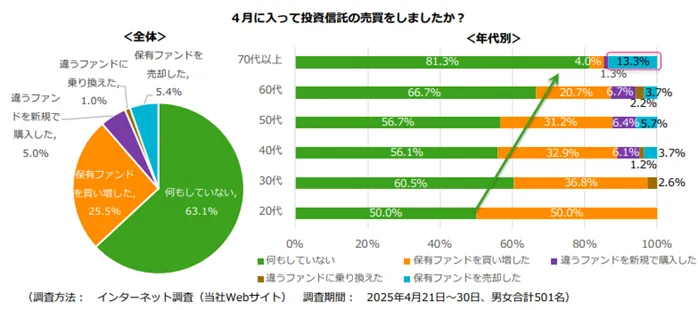

Investors Stay Calm Amid Market Fluctuations Due to Tariff Changes
Investors Maintain Composure During Market Turbulence
In a recent survey conducted by Asset Management One, a notable 63.1% of mutual fund holders reported that they did nothing in response to market fluctuations triggered by the tariff policy announced by the Trump administration in April 2025. This survey drew on the perspectives of 501 respondents, primarily drawn from their website visitors and subscribers to their daily valuation updates.
Survey Overview
The investigation was prompted by the dramatic ups and downs in the global markets following the tariff announcements in April. The objective was to explore the behavioral trends of mutual fund investors during such an unstable market environment. It's important to note that the participants might lean towards individuals who are more knowledgeable about asset management, potentially altering the typical trends associated with general surveys.
Key Findings
1. A Majority Chooses Inaction
A significant 63.1% of respondents indicated they did nothing regarding their investments in April. Only 5.4% decided to sell their funds. This suggests that most investors maintained a long-term perspective, demonstrating resilience against short-term market volatility.
2. Age-specific Trends in Investment Behavior
Across all age groups, more than half of respondents reported no action taken. Among investors aged 70 and above, over 80% opted for inaction. Conversely, younger generations showed a stronger inclination toward buying more shares, particularly those in their 40s to 60s, who were noteworthy participants in new fund purchases.
3. Rational Decision-Making Among Investors
The primary reasons cited for doing nothing included:
- - Long-term investment goals: Many express a focus on long-term asset accumulation.
- - Acceptance of market fluctuations: A clear understanding that markets are inherently volatile led many to refrain from rash decisions.
- - Commitment to steady investment: Several noted the importance of continuing their accumulation strategies, regardless of market conditions.
On the flip side, those who engaged in active decision-making stated comments reflective of strategic thinking, such as:
- - “Taking the drop in fund values as an opportunity to reduce my average acquisition cost” (a male in his 30s).
- - “Purchasing undervalued products to diversify my investment portfolio” (a female in her 40s).
4. Asset Class Preferences
In examining the most favored asset classes at present, the following results emerge:
1. U.S. equities (34.3%)
2. Global equities (19.4%)
3. Gold (18.0%)
4. Domestic equities (17.2%)
Interestingly, younger investors showed a higher interest in foreign assets, while older demographics tended to prioritize domestic investments.
Conclusion
The survey reveals that the majority of participating investors are holding onto their mutual funds with a long-term investment horizon. Despite the disruptive market caused by tariff changes, the investors displayed an admirable level of calm and rational decision-making. The findings highlight the presence of a sound asset management environment where investors are not swayed by short-term fluctuations but stick to their strategic plans. This reflects a healthy and disciplined approach to asset management, crucial for achieving long-term financial goals.
For more detailed insights, the complete survey is available here: Investor Survey on Tariff Impact
About Asset Management One
Established in October 2016, Asset Management One is a leading asset management firm with around JPY 69 trillion in managed assets as of March 2025. With a corporate message of “Nurturing the Future through Investment Power,” the firm leverages both traditional active management and cutting-edge investment strategies to meet the varied needs of individual and institutional investors. For additional information, visit the official website: Asset Management One.

Topics Financial Services & Investing)










【About Using Articles】
You can freely use the title and article content by linking to the page where the article is posted.
※ Images cannot be used.
【About Links】
Links are free to use.